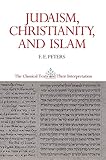Judaism, Christianity, and Islam: The Classical Texts and Their Interpretation, Volume II : The Word and the Law and the People of God / F. E. Peters.
Material type: TextPublisher: Princeton, NJ : Princeton University Press, [2021]Copyright date: ©1990Description: 1 online resource (424 p.)Content type:
TextPublisher: Princeton, NJ : Princeton University Press, [2021]Copyright date: ©1990Description: 1 online resource (424 p.)Content type: - 9780691228358
- online - DeGruyter
| Item type | Current library | Call number | URL | Status | Notes | Barcode | |
|---|---|---|---|---|---|---|---|
 eBook
eBook
|
Biblioteca "Angelicum" Pont. Univ. S.Tommaso d'Aquino Nuvola online | online - DeGruyter (Browse shelf(Opens below)) | Online access | Not for loan (Accesso limitato) | Accesso per gli utenti autorizzati / Access for authorized users | (dgr)9780691228358 |
Frontmatter -- Contents -- Preface -- Acknowledgments -- A Brief Chronology -- Introduction -- CHAPTER 1 The Words of God: Revelation and Scripture -- CHAPTER 2 On Understanding Scripture -- CHAPTER 3 Scripture and Tradition -- CHAPTER 4 The Law of God -- CHAPTER 5 The New Covenants -- CHAPTER 6 One God, One Faith, One Community -- Short Titles -- Index
restricted access online access with authorization star
http://purl.org/coar/access_right/c_16ec
Invoking a concept as simple as it is brilliant, F. E. Peters has taken the basic texts of the three related--and competitive--religious systems we call Judaism, Christianity, and Islam and has juxtaposed them in a topical and parallel arrangement according to the issues that most concerned all these "children of Abraham." Through these extensive passages, and the author's skillful connective commentary, the three traditions are shown with their similarities sometimes startlingly underlined and their well-known differences now more profoundly exposed. What emerges from this unique and ambitious work is a panorama of belief, practice, and sensibility that will broaden our understanding of our religious and political roots in a past that is, by these communities' definition, still the present. The hardcover edition of the work is bound in one volume, and in the paperback version the identical material is broken down into three smaller but self-contained books. The second, "The Word and the Law and the People of God," discusses the scriptures of the three faiths in various contexts, exegetical and legal. Throughout the work we hear an amazing variety of voices, some familiar, some not, all of them central to the primary and secondary canons of their own tradition: alongside the Scriptural voice of God are the words of theologians, priests, visionaries, lawyers, rulers and the ruled. The work ends, as does the same author's now classic Children of Abraham, in what Peters calls the "classical period," that is, before the great movements of modernism and reform that were to transform Judaism, Christianity, and Islam.
Mode of access: Internet via World Wide Web.
In English.
Description based on online resource; title from PDF title page (publisher's Web site, viewed 30. Aug 2021)


